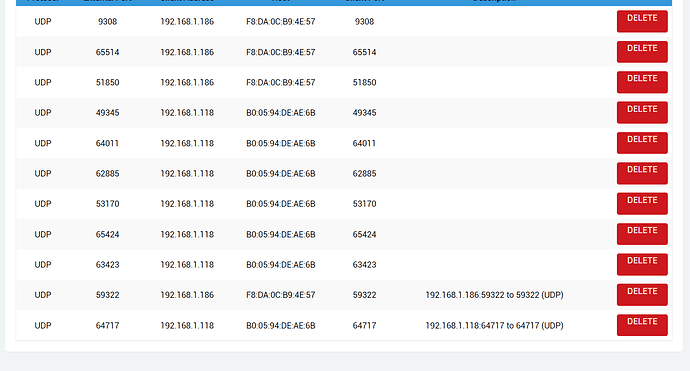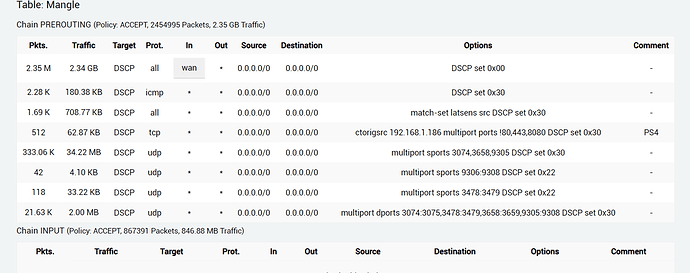#!/bin/ash -x
IPT="iptables"
iptmark="iptables"
##ipset for streming sites.they are bening filled by dnsmasq
ipset create streaming hash:ip
ipset create usrcdn hash:ip
ipset create bulk hash:ip
ipset create latsens hash:ip
## flush mangle table ##
$IPT -t mangle -F PREROUTING
#Clear interface dscp marks, we don't trust ISP marks(also to use our own marks).
$IPT -t mangle -A PREROUTING -i wan -j DSCP --set-dscp 0
########################################
# Latency Sensitive (gaming/voip)
########################################
##Latency Sensitive
$IPT -t mangle -A PREROUTING -p icmp -j DSCP --set-dscp-class CS6 ##dscp tag for ping packets
$IPT -t mangle -A PREROUTING -m set --match-set latsens src -j DSCP --set-dscp-class CS6 ## set dscp tag for our Latency Sensitive (latsens) ipset
$IPT -t mangle -A PREROUTING -p tcp -m conntrack --ctorigsrc 192.168.1.186 -m multiport ! --ports 80,443,8080 -j DSCP --set-dscp-class CS6 -m comment --comment "PS4" #i don't have PS4, change the ip according to your ip setting.
####Latency Sensitive Ports####
sport00="3074"
sport4="9305:9308"
sport16="3478:3479"
dport00="3074:3075,3478:3479,3658:3659,9305:9308"
$IPT -t mangle -A PREROUTING -p udp -m multiport --sport $sport00 -j DSCP --set-dscp-class CS6
$IPT -t mangle -A PREROUTING -p udp -m multiport --sport $sport4 -j DSCP --set-dscp-class AF41
$IPT -t mangle -A PREROUTING -p udp -m multiport --sport $sport16 -j DSCP --set-dscp-class AF41
$IPT -t mangle -A PREROUTING -p udp -m multiport --dport $dport00 -j DSCP --set-dscp-class CS6
$IPT -t mangle -N dscp_mark > /dev/null 2>&1
$IPT -t mangle -F dscp_mark
## check if POSTROUTING already exits then jumps to our tables if not, add them
$IPT -t mangle -L POSTROUTING -n | grep dscp_mark || $IPT -t mangle -A POSTROUTING -o br-lan -j dscp_mark
iptmark() {
$IPT -t mangle -A dscp_mark "$@"
}
#A robust 2 rules to detect realtime traffic
iptmark -p udp -m hashlimit --hashlimit-name udp_high_prio --hashlimit-above 100/sec --hashlimit-burst 50 --hashlimit-mode srcip,srcport,dstip,dstport -j CONNMARK --set-mark 0x55 -m comment --comment "connmark for udp"
# unmarked UDP streams with small packets get CS6
iptmark -p udp -m connmark ! --mark 0x55 -m multiport ! --ports 22,25,53,67,68,123,143,161,162,514,80,443,8080 -m connbytes --connbytes 0:940 --connbytes-dir both --connbytes-mode avgpkt -j DSCP --set-dscp-class CS6 -m comment --comment "small udp connection gets CS6"
iptmark -p udp -m connmark ! --mark 0x55 -m multiport ! --ports 137,442,444,445,446,447 -m connbytes --connbytes 0:940 --connbytes-dir both --connbytes-mode avgpkt -j DSCP --set-dscp-class CS6 -m comment --comment "small udp connection gets CS6"
#large udp streams like video call get AF41
iptmark -p udp -m connmark ! --mark 0x55 -m multiport ! --ports 22,25,53,67,68,123,143,161,162,514,80,443,8080 -m connbytes --connbytes 940:1500 --connbytes-dir both --connbytes-mode avgpkt -j DSCP --set-dscp-class AF21 -m comment --comment "large udp connection gets AF21"
iptmark -p udp -m connmark ! --mark 0x55 -m multiport ! --ports 137,442,444,445,446,447 -m connbytes --connbytes 940:1500 --connbytes-dir both --connbytes-mode avgpkt -j DSCP --set-dscp-class CS6 -m comment --comment "small udp connection gets CS6"
#DNS traffic both udp and tcp
iptmark -p udp -m multiport --port 53 -j DSCP --set-dscp-class CS6 -m comment --comment "DNS udp"
#NTP
iptmark -p udp -m multiport --port 123 -j DSCP --set-dscp-class CS6 -m comment --comment "NTP udp"
#High priority ipset, i use for pubgM
iptmark ! -p udp -m set --match-set latsens src,dst -j DSCP --set-dscp-class CS6 -m comment --comment "latency sensitive ipset" ## set dscp tag for Latency Sensitive (latsens) ipset,udp
iptmark -p tcp -m set --match-set latsens src,dst -j DSCP --set-dscp-class CS6 -m comment --comment "latency sensitive ipset" ## set dscp tag for Latency Sensitive (latsens) ipset
###########
##Browsing
###########
## medium priority for browsing
iptmark -p tcp -m multiport --ports 80,443 -j DSCP --set-dscp-class CS3 -m comment --comment "Browsing at CS3"
##################
#TCP SYN,ACK flows
##################
#Make sure ACK,SYN packets get priority (to avoid upload speed limiting our download speed)
iptmark -p tcp --tcp-flags ALL ACK -m length --length :128 -j DSCP --set-dscp-class CS3
iptmark -p tcp --tcp-flags ALL SYN -m length --length :666 -j DSCP --set-dscp-class CS3
#Small packet is probably interactive or flow control
iptmark -m dscp ! --dscp 24 -m dscp ! --dscp 18 -m dscp ! --dscp 34 -m dscp ! --dscp 40 -m dscp ! --dscp 48 -m length --length 0:500 -j DSCP --set-dscp-class CS3
#Small packet connections: multi purpose (don't harm since not maxed out)
iptmark -m dscp ! --dscp 24 -m dscp ! --dscp 18 -m dscp ! --dscp 34 -m dscp ! --dscp 40 -m dscp ! --dscp 48 -m connbytes --connbytes 0:250 --connbytes-dir both --connbytes-mode avgpkt -j DSCP --set-dscp-class CS3
########################################
# Streaming Media (videos/audios)
########################################
#Known video streams sites like netflix
iptmark -m set --match-set streaming src,dst -j DSCP --set-dscp-class AF41 -m comment --comment "video audio stream ipset"
#known usrcdn like google or akamai
iptmark -m set --match-set usrcdn src,dst -j DSCP --set-dscp-class AF21 -m comment --comment "usrcdn ipset"
#########################################
# Background Traffic (Bulk/file transfer)
#########################################
#bulk traffic ipset, like windows udates and steam updates/downloads
iptmark -p tcp -m set --match-set bulk src,dst -j DSCP --set-dscp-class CS1 -m comment --comment "bulk traffic ipset"
iptmark -p udp -m set --match-set bulk src,dst -j DSCP --set-dscp-class CS1 -m comment --comment "bulk traffic ipset"
iptmark -p tcp -m connbytes --connbytes 350000: --connbytes-dir both --connbytes-mode bytes -m dscp --dscp-class CS3 -j DSCP --set-dscp-class CS1 -m comment --comment "Downgrade CS3 to CS1 for bulk tcp traffic"
This is what i use for dscp marks in conjunction with upnp and stun server.... Here is my dnsmasq file which needs some updating now that im looking at it...



